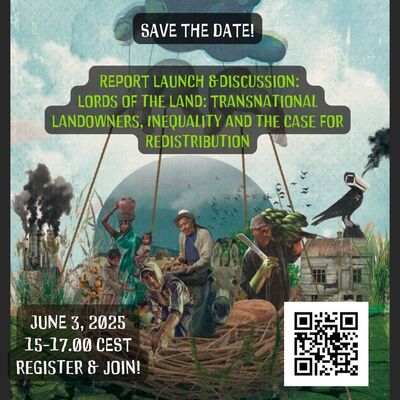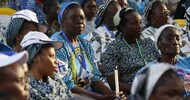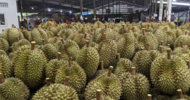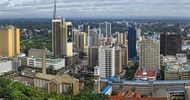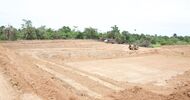The people of Gagarawa are angry with the governor over the seizure of their farmlands, which the state government handed over to foreign investors for an irrigation farming project.
- Premium Times
-
05 February 2019
The communities of the DR Congo want a resolution to a land conflict that dates back to the Belgian colonial period with a palm oil company that is currently being financed by a consortium of European development banks led by DEG.
- RIAO-RDC et al
-
07 November 2018
Interview with top executives of Phoenix Group, the world's 3rd largest rice trader controlling 150,000 ha of farmland in different parts of the world
- OFID Quarterly
-
30 July 2018
There is a large gap between SOCFIN's “responsible management” policy and the reality of violence and destruction around its plantations, where, with the complicity of national governments, the company attempts to suppress people’s resistance.
NGOs in Sarawak and around the world report failures by the Sarawak government to uphold indigenous land rights, and failures by international banks and investors to ensure their investments are conflict-free.
Sierra Leone's Minister of Agriculture has called for a review of the flawed 50 year land lease agreement signed in 2011 between land owners and Socfin Agriculture Company
Malen Youth Development Union issues second complaint letter to SOCFIN about the grave abuses of workers at its oil palm plantations in Sierra Leone and issues of unfulfilled development promises for locals.
The Roundtable on Sustainable Palm Oil is reviewing its finding about the palm oil company’s activities in the Kapa people’s customary territory.
Over the past several years, a small band of grassroots advocates has been helping communities secure progressively better arrangements with investors interested in their land.
The company, PT Nabire Baru, is alleged to have grabbed indigenous lands. Its parent, Goodhope, is a member of the Roundtable on Sustainable Palm Oil.
Large land concessions are detrimental to the livelihoods of rural communities, who have drawn little benefit from these concessions and have had no effective remedy or recourse when their rights are infringed or violated.
In its letter to the RSPO, Plantaciones de Pucallpa claims to have divested all its palm oil estates, land, related activities and equipment and PdP has no involvement in the Palm oil industry.
Farmers on Palawan are being tricked into giving land away to palm oil companies with local government support. Those who resist the land grabs are now in fear for their lives following the murder of a prominent campaigner.
- Truth-out
-
10 January 2016
The Treasurer said the size and location of the properties means selling them to a foreign buyer would be "contrary to the national interest", and the deal cannot go ahead.
Agricultural investment, productivity and land rights in the context of large-scale investments
Background document accompanying the 14 February 2014 media release issued by Tax Justice Network, GRAIN, Anywaa Survival Organisation, Forum Syd Kenya and the South Indian Coordination Committee of Farmers Movements.
- TJN et al
-
14 February 2014
Communities face a “double whammy” in which High Carbon Stock areas restrict locals from cultivating the land while companies establish plantations outside of the zone where people are already farming.
- Eco-Business
-
20 January 2014
Nearly 150 homes destroyed in the latest incident in conflict between indigenous Batin Sembilan residents and former Wilmar company.
- Mongabay
-
14 December 2013
Throughout Merauke Regency in the southern part of West Papua, a land controversially annexed by Indonesia 50 years ago, indigenous communities are having to learn fast how to resist corporate manipulations.
- Awas MIFEE
-
23 October 2013
On the margins of the annual World Bank land and poverty conference in April a donor roundtable agreed to establish a first global donor working group on land, which was launched recently. Video interview with the first chair of the group, from DFID.
- Donor Platform
-
01 September 2013
Investments by the World Bank's IFC in financial intermediaries are alleged to have financed 'land grabs' in South East Asia and violations of indigenous people's rights in Honduras.
- Bretton Woods Project
-
26 June 2013
Pressed on which countries in Africa would be suitable food sources, Hisham Abdullah Al Shirawi, the chairman of Economic Zones World, says the test would be countries where water was in abundance and which were not spoilt by strife.
- Halal Focus
-
15 April 2013
The "land grabbing" in Africa and elsewhere often triggers conflict, an underreported financial risk, says Samuel Nguiffo
With the coming of big industrial farms in Ethiopia, local people, villagers and pastoralists are being threatened, intimidated, forcibly displaced and herded into camps by the military, their homes destroyed.
- Redress Information & Analysis
-
01 Mar 2013
Oil palm giant, Wilmar Nigeria Limited, and the Rainforest Resource and Development Centre (RRDC), an environmental rights group, are currently at logger heads over a massive land grab in a rural community in Cross River State, Southern Nigeria.
- All Voices
-
18 November 2012
Olam International, an India-based multinational agribusiness company, is developing an outgrower scheme on a giant 20-year, 850,000 hectare concession it has secured not far from the port of Beira, Mozambique.
Mawashi, Qatar’s livestock company, plans to invest in industrial agriculture and food sources outside Qatar to serve the vision and objectives of the Qatar National Food Security Programme, it was announced yesterday.
- Gulf Times
-
07 September 2012
New law for land restitution comes just as foreign and local billionaires such as Brazil’s Eike Batista and Colombia’s Luis Carlos Sarmiento are stepping up investments in remote parts of the nation.
From the World Bank to pension funds, efforts are under way to regulate land grabs through the creation of codes and standards. Rather than help financial and corporate elites to "responsibly invest" in farmland, we need them to stop and divest.
It is expected that the final report of the Commission of Inquiry into Special Agricultural and Business Leases (SABLs) will shortly be tabled in Papua New Guinea’s national parliament, but no one yet knows what it will recommend, let alone whether Peter O’Neill’s new government will act on those recommendations.
- Development Policy
-
22 August 2012




